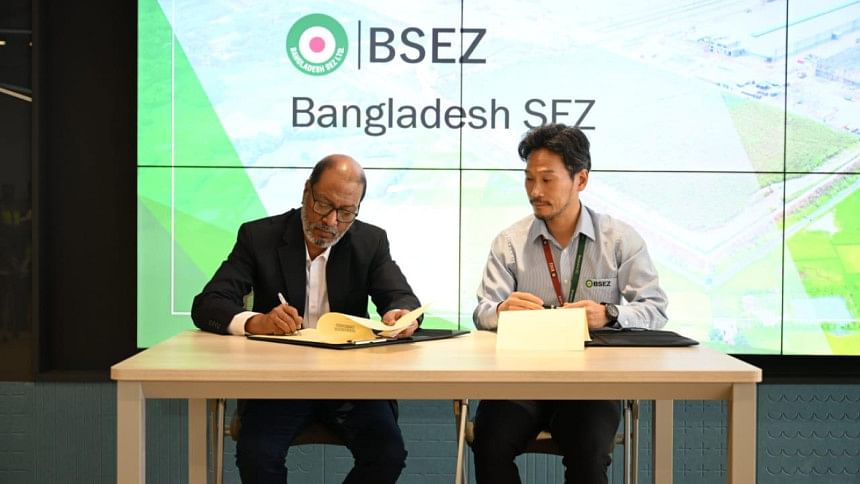Investors seek policy continuity, conducive business climate

Seeing robust potential in Bangladesh, foreign investors have called on the interim government to ensure policy consistency and uphold its commitment to fostering a more predictable and business-friendly environment.
Investors also stressed that the government should intensify its efforts to attract foreign investment by offering more competitive incentives and adopting investor-friendly policies.
These demands were voiced by a group of foreign investors during a visit to the Bangladesh Special Economic Zone (BSEZ) in Narayanganj on Tuesday as part of the four-day Bangladesh Investment Summit 2025.
The Bangladesh Investment Development Authority (Bida) has organised the summit to highlight investment opportunities and demonstrate the impact of economic reforms undertaken following the July mass uprising.
About 36 investors and representatives from companies in China, Japan, the United States, India, and other countries visited the BSEZ -- also known as the Japanese Economic Zone.
"I see a great opportunity in Bangladesh. However, the government, Bangladesh Economic Zones Authority, and BSEZ should uphold the commitments they have made to facilitate us," said Mohammad Abdul Quyum, managing director of Nilorn Bangladesh, a Swedish company.
Yesterday, Nilorn Bangladesh signed a memorandum of understanding (MoU) with BSEZ to establish a factory in Narayanganj.
"We already have a garments factory in Bangladesh. Now, we are planning to make a larger investment to produce garment accessories in the BSEZ," Quyum said at a media briefing.
Investors also stressed that the government should intensify its efforts to attract foreign investment by offering more competitive incentives
"We will gradually invest between $11 million and $14 million. The project will create job opportunities for nearly 300 people," he added.
When asked about the investment timeline, he said, "The timeline will depend on when the agreement is signed. As per regulations, construction work must begin within six months of signing. We will try to follow it."
Upon arrival at the BSEZ, authorities briefed the visiting delegation on the zone's infrastructure and available facilities. The group later toured the Singer factory located within the zone.
Speaking to journalists, Taro Kawachi, managing director of BSEZ, said the Singer factory is a prime example of the kind of modern industrial facilities that can be established in Bangladesh.
"Singer completed construction of the facility within just 20 months, investing $78 million. The factory currently produces 50,000 refrigerators and 10,000 televisions per month," he said.
Kawachi added that BSEZ offers a wide range of world-class services. Notably, bonded transport facilities have been provided within the zone itself to ease the import of goods and raw materials -- eliminating the need for customs clearance at the port.
"Investors will not face any difficulties here," he assured.
WHAT INVESTORS SAY
Nicholas Qi, CEO of Chinese IT services firm Genew Bangladesh Ltd, said Bangladesh holds considerable investment potential but continues to face key challenges, with the lack of policy continuity being most notable.
"The interim government has taken some encouraging steps," he said. "We hope it will maintain a consistent policy framework moving forward."
Wu Jianbo, secretary general of the China-based Green and Smart Energy Organization, said Bangladesh can further strengthen its efforts to attract foreign investment by offering more incentives and favourable policies.
"I believe this is crucial for the country's economic development. In fact, China also started its growth by promoting exports and attracting investment in a similar way," he said.
He added that the main challenge is the issue of market demand.
"Now that I've come here, my key question is: Who will be my customers? How can I open up the market for my products? If there was more support or connections in this area, I would feel much more confident in moving forward with investment plans."
Iftikher Mahmood, a US-based non-resident Bangladeshi and founder of Hope Foundation, also hoped to invest in Bangladesh.
"I have been investing in the healthcare sector of Bangladesh for two decades by building multiple hospitals and framing health programmes for marginalised communities," he said.
"Along with other expatriate Bangladeshis living in the US, we want to build quality private hospitals and educational institutions to create a global standard workforce that will be able to serve at home and abroad," he added.
In response to a question about challenges in the country, HM Fairoz, managing director of Singer Bangladesh Limited, said, "There are various challenges everywhere in the world. However, we are witnessing positive developments in Bangladesh.
"People often say Bangladesh is a land of opportunities, with a population of nearly 180 million and low market penetration for many of our products," he said.
"We are here to grow our business, and we look forward to the support of all the relevant authorities."
After the visit, Mohammad Abul Kalam Azad Majumder, deputy press secretary to the chief adviser, told journalists that investors expressed satisfaction after visiting Bangladesh's economic zones.
"The interim government is working to remove previous obstacles to investment -- particularly by implementing one-stop service centres," he said.
He acknowledged that regulatory barriers and a lack of good governance had previously discouraged investment.
"The current administration is working to resolve these issues," he added.

 For all latest news, follow The Daily Star's Google News channel.
For all latest news, follow The Daily Star's Google News channel. 




Comments